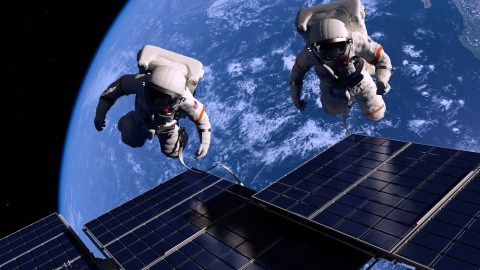Should America Be Jealous of China’s “Space Kiss”?

With the successful docking of its Tiangong space module and the Shenzhou-8 space craft this week – the so-called “Space Kiss” – China has shown the world that it is ready to take over the driver’s seat in the international space race that, until now, had been dominated by the U.S. and Russia. Next year, China plans to have a manned docking process in place. By 2020, China plans to have a fully-operational manned space station in orbit. By 2030, China’s plans are even grander – not just to fly a manned mission to the moon, but to have a lunar base on the moon as well. As China puts more spacecraft into orbit and prepares its manned space station to replace the aging International Space Station – the big question is whether the Chinese “Space Kiss” will draw the U.S. and China closer together – or push them further apart.
For nearly the past 25 years, the U.S. and China have had a frosty relationship when it comes to the exploration of outer space. Not only does the U.S. ban the commercial transfer of aerospace technology to the Chinese – it has also effectively barred Chinese scientists from taking part in any U.S.-led space conferences. China is also one of 16 nations banned from setting foot in the International Space Station, giving even greater impetus to the Chinese efforts to create a “Made in China” solution for the manned exploration of outer space.
After the “Space Kiss,” however, there has been speculation about a possible partnership between the China and the U.S. for an exploratory mission to Mars. To make that a reality, however, the U.S. Congress needs to pull down the walls preventing the cooperation between the two nations. In short, astronauts and taikonauts need to be able to work hand-in-hand in outer space.
The wild card in all this, of course, is why China is so interested in space in the first place. People outside the NASA establishment like to point out that “space is expensive to enter” and “hard to sustain assets in.” Not only only that, but military experts point out that any assets in outer space are sitting targets, due to their predictable orbits. Taking an optimistic view of things, people point to the Chinese psychological need to create a myth great enough to sustain the Communist Party, in the same way that former Soviet Union attempted to use Sputnik to prove the superiority of its social and economic model to its own people. Taking a darker view, of course, China’s space plans are part of a stealthy militarization of space that could end of threatening nations such as the U.S. China’s space program, indeed, is coordinated by the nation’s military, and even basic operations like a space docking rendezvous typically bear all the signs of a militaristic adventure. There are understandably concern in the Pentagon about China’s military plans for the future: Do they include outer space?
Should America be as concerned about the Chinese “Space Kiss” as when the Soviet Union launched its Sputnik satellite in 1957? Whether it’s federal budgetary pressures at home or the simple fatigue about hearing about the “Rise of China” one more time, there simply doesn’t appear to be any urgency in America right now to go back to space. Now that NASA has essentially passed the baton for space exploration to the private sector, Virgin Galactic’s quixotic plan to build a space port in the middle of the New Mexico desert is suddenly one of the best options out there for getting U.S. manned space exploration moving again. Maybe, just maybe, the “Space Kiss” celebrated throughout China (and broadcast live on national TV) will fire up America’s best and brightest entrepreneurs to rekindle the passion we once had for manned space exploration.
Astronauts in Space / Shutterstock





